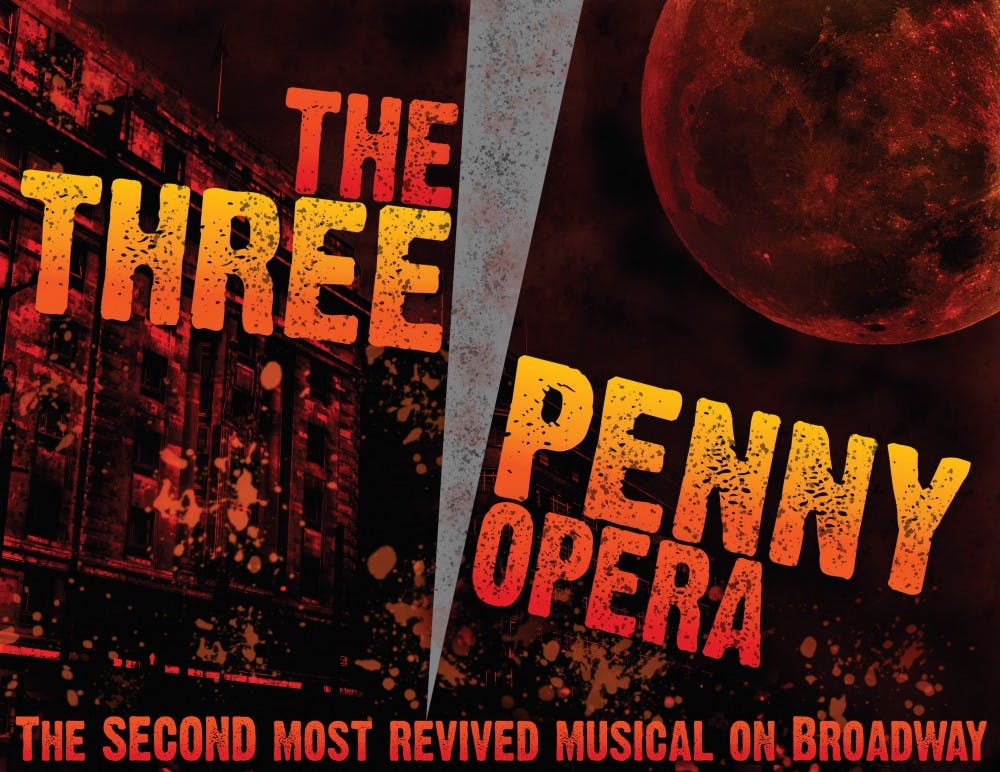“The Threepenny Opera” has been pushing boundaries for 91 years.
And UB’s Theatre and Dance Department is continuing that push.
There will be an advisory sign on the door for “risque” content on the opening night of the play this week.
The show, which explores violence, sex and drug use, is a criticism of capitalism that focuses on the amoral, anti-hero Macheath, or “Mack the Knife.” “The Threepenny Opera” will run in the CFA’s Drama Theatre from Thursday to Sunday. The original version of “The Threepenny Opera” premiered in 1928 in Berlin, and the new adaptation premiered in 2016 at the National Theatre in London. UB’s production is a new adaptation by the award-winning playwright Simon Stephens, and will be the first time the new version is performed in the U.S.
Nathan Matthews, director of music theatre, has worked on four productions of “The Threepenny Opera,” including UB’s current incarnation. Matthews is quick to discuss the dichotomy of the work’s title as an opera, but the songs as anything but that.
“[While] it’s a play titled “The Threepenny Opera,” … the songs are not opera. They’re jazz and cabaret style songs until the end when we have our parody of opera,” Matthews said. “Opera is an art form that’s usually frequented by the rich and bourgeois, you know, comfortable upper-middle-class people. So, there’s a statement being made about, ‘You rich people who sit in your seats while you watch us poor people starve.’”
Matthews said Stephens’ version made some positive adjustments to the original play. In this new adaptation, the female characters are written stronger, the play flows better and is less episodic and some of the dialogue has been cut to show intent more quickly.
“I think that the characters are drawn very strongly,” Matthews said. “What is Macheath? [From] what he says and what he does, it’s very clear that he’s a sociopathic criminal who’s a rapist and someone who controls people for his own benefit. But, he’s the hero of our play [and] until a certain point, you root for him even though you know what he is.”
The student cast has rehearsed since the beginning of February, and the crew has been working on staging throughout the past month.
“Everyone’s excited … to play unsavory, bad people. The play is about social injustice in government and police corruption, and that many common people don’t get a fair shake,” Matthews said. “And I think we still see it today. I think that Simon Stephens found a way to put it in language that relates more easily than other translations did.”
Nathan Roberts, a sophomore music theatre major, is playing the role of Macheath and is one of the many students excited for this production.
“‘The Threepenny Opera’ is a marathon of a show. It has a lot of material and we have to make sure that we keep the pace moving forward,” Roberts said.
While the show explores serious, dark topics, Roberts said the audience should not be afraid to laugh because the script is filled with humor.
“The first time I read the script I was confused because the topics addressed were so dark, yet I found myself smiling or laughing throughout a majority of the experience,” Roberts said. “If there was one thing I’d like audience members to know, it’s that it’s OK to laugh.”
Kelsey Marlowe Jessup, a junior music theatre major, plays the role of Celia Peachum, who is the wife of the main antagonist, Jonathan Jeremiah Peachum.
Behind the scenes, Jessup says the design team has done an amazing job, especially with costumes and makeup.
Kaitlyn Johnson, a fifth-year theatre design technology and media studies major, is one of seven costume design team members for the show.
She said the group has done historical research for the costumes because the show is set in the late 1920s, early 1930s.
The production is Johnson’s second show she has done costume designs for, and she likes that the designers are completely making the costumes.
“At least three out of the four characters that I’ve designed we have made from scratch or major elements of the costume were made from scratch,” Johnson said. “So, actually finally being able to be a part of that process was very interesting to me.”
Jessup said audience members should come to the show with an open mind.
“It’s always interesting to see how different people react to theater,” Jessup said. “Of course, everything is going to be subjective to the audience member, and any reaction, … as an actor, is a good reaction [because] that’s the goal of theater in itself. [However,] just know that this show is meant to get in your face, to make you think, and to help you be an active audience member rather than not.”
Anastasia Wilds is an arts staff writer and can be reached at arts@ubspectrum.com
Anastasia Wilds is the senior arts editor. She has been writing for newspapers since her junior year of high school, and she has appreciated all forms of art for even longer. When she’s not writing, she is either reading, listening to music, hanging out with her friends on discord or streaming on Twitch.





